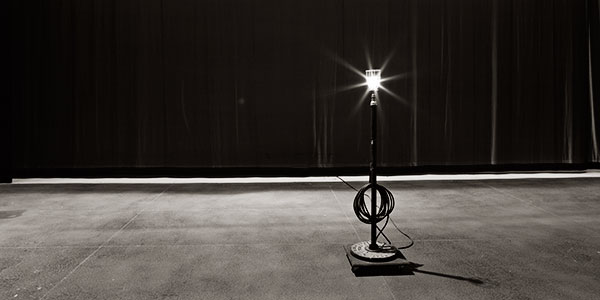JR Clancy Rigging Report: The Ghost Light

Copyright 2009 Paul Butzi - www.butzi.net
This weeks JR Clancy Rigging Report brings us yet another Superstition that we theatre people take to heart, the Ghost Light. While the Ghost Light has a practical use while the stage is dark, there is a deeper meaning behind it.
Most theatres have a ghost. This fact is known from high schools in Iowa to The Majestic Theatre in New York City. Fortunately for those uneasy about being greeted by a supernatural cohabitant, there is a method of keeping these ghosts at bay that has been around for many years: the Ghost Light. Typically the Ghost Light is turned on before the theatre is closed for the night and left on center stage. This illumination has the power to keep the ghosts in hiding and the theatre safe for the living who may dare to enter.
The Ghost Light has a practical use as well. Backstage can be a dangerous place in the dark. There can be scenery, platforms, chairs, and many other items left on stage to be tripped over. There is also the danger of someone falling off the stage and into the seating or the orchestra pit. The Ghost Light provides enough light for a person to find the lighting control switch and navigate safely around the stage.
As technology has advanced, and energy efficiency takes hold, some theatres have replaced the ghost light with computer-programmed lighting or occupancy sensors. While this new technology may save energy, the question remains, will the ghosts again have free reign on our performance spaces?
Want to sign up for the JR Clancy Rigging Report, visit the registration site here.
JR Clancy Rigging Report: Theatrical Superstitions & Missing Catalogs

This months JR Clancy Rigging Report mentions something that almost every person in theatre knows about, but talks very little about it, Theatrical Superstitions. Why do we do such things? Why does a pitcher on a winning streak on wash hit uniform? It’s all about doing what ever it takes to keep winning or to put on a great show.
We have all heard about the common theatrical superstitions, such as never saying the name Macbeth in a theatre and never wishing a performer “Good Luck.” Here’s the lore behind one superstition with a rigging background.
Whistle While You Work…
Not in this business! Several years ago I was working at a theatre company in New Haven, Connecticut. It was about an hour before the show on opening night, and I was whistling along with a song on the radio while testing the motorized turntable when I was approached by the lead actor of the show and told to stop immediately or he would not go on!
When theatrical rigging was in its infancy, sailors who were familiar with pin rails, knots, and pulleys, were hired to fly the scenery and drapery. These sailors took what they knew about raising and lowering sails and applied it to the theatre. One tradition of sailing that made its migration to the theatre was whistling. The sailors/riggers would whistle across the stage to cue the movement of scenery. The superstition of never whistling on stage supposedly started when an actor was casually whistling on stage. One of the sailors thought that it was his cue, and lowered a piece of scenery onto the musical actors head.
While cue lights and headsets have replaced whistling as a form of communication, the superstition has lived on. So remember, next time you are working on stage and just dying to whistle along with that new Britney tune, think twice and stay alert!
Did you know that JR Clancy has been in the business for over 125 year? While doing some cleaning around the office lately, they noticed they were missing some of their older catalogs…
Our filing system is pretty good, but over decades things can go missing. As we enter our 125th year of doing business, we are trying to fill in some gaps so we are looking for your help in retrieving copies of our missing catalogs.
Please look in your file of Clancy information for a spare copy of the following catalogs:
- Catalog # 3 – Date: 1887 – 1888
- Catalog # 4 – Date: 1887 – 1888
- Catalog #13 – Date: 1896 – 1898
- Catalog #27 – Date: 1916 – 1918
- Catalog #29 – Date: 1918 – 1921
If you have any of these catalogs, JR Clancy is willing to pay the first person to send it in $200. Contact Rob Kaiser.
LatestHeadlines
- Upgrading Your Toolbox: City Theatrical DMXcat-E and DMXcat Multi Function Test Tool
- Claypaky Bringing Back the Sexy to Par Cans with the Midi-B FX
- Ayrton Evolves the Cobra, the Cobra2 Developed for the US Market
- MA Lighting Intros grandMA3 onPC Fader Wing and DIN-Rail Nodes
- Live Events LEVL Up Fest: A Festival to Aid our Industry